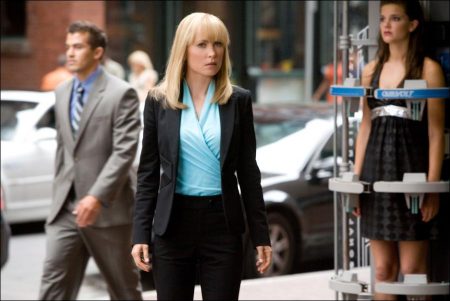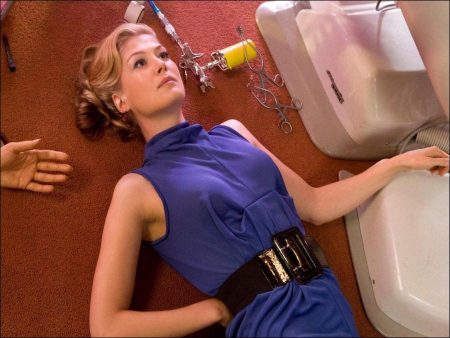Tagline: Share yourself.
Surrogates movie storyline. FBI agents (Bruce Willis and Radha Mitchell) investigate the mysterious murder of a college student linked to the man who helped create a high-tech surrogate phenomenon that allows people to purchase unflawed robotic versions of themselves—fit, good looking remotely controlled machines that ultimately assume their life roles—enabling people to experience life vicariously from the comfort and safety of their own homes. The murder spawns a quest for answers: in a world of masks, who’s real and who can you trust?
First the computer. Then email, tiny cell phones and the Internet. Today, sexy robotic surrogates fill in for their less attractive human counterparts—regular people who no longer have to venture out into the real world themselves. In the world of “SURROGATES,” has technology gone too far?
Surrogates is a 2009 American science fiction mystery film, based on the 2005–2006 comic book series The Surrogates. Directed by Jonathan Mostow, it stars Bruce Willis as Tom Greer, an FBI agent who ventures out into the real world to investigate the murder of surrogates (humanoid remote controlled robots). It also stars Radha Mitchell, Rosamund Pike, Boris Kodjoe, Ving Rhames, and James Cromwell.
Surrogates played at 2,992 theaters, generating $5,053,646 on its opening day. On its opening weekend, it grossed to $14,902,692, averaging $5,050 per theater, ranking #2 at the U.S. box office, behind Cloudy with a Chance of Meatballs. For the second weekend of Oct 2-4th, it saw a 45% decrease where it dropped down to 4th place at the box office only to gross $7,241,054. The third domestic weekend release saw a 36% decrease, which was 9% less than its last weekend. The film went on to gross $38,577,772 domestically and $83,867,000 internationally, giving it a worldwide gross of $122,444,772, making it a moderate box office success.
About the Production
“The premise of the movie is that surrogacy has taken over the world like cell phones and computers,” says director Jonathan Mostow. “Surrogates are new devices that offer users the opportunity to experience life vicariously from the comfort and safety of their own homes. In our film, surrogates represent the ultimate freedom, from both physical harm and the mental toll of everyday life. Pleasure is achievable simply by plugging in. “But for some, surrogacy feels like the abandonment of humanity itself,”
Mostow continues. “In a world where actual physical contact is increasingly rare, does the very notion of love threaten to lose its meaning? Those are some of the ideas we explore in our story.”
First-time author Robert Venditti came up with the unique premise while working at Top Shelf Publications in their shipping warehouse in suburban Atlanta. Looking for a new spin on the graphic novel, Venditti recalled a sociology book he had read for one of his graduate school courses which depicted “an actual study of people who played one of those early community-type online games,” says Venditti. “I was fascinated by how these people just became so involved in this game, creating these alternate personas for themselves. They became so identified with them that they would lose their jobs, their marriages, because they just couldn’t separate their lives from this persona that they created. It was an idea that stuck with me—the basic human desire to be something other than oneself.”
The author fleshed out his idea further by imagining various reasons people would have for using a surrogate. “My idea was to create this persona that would go to work and earn money for you, a practical reason for having a surrogate. I looked at the idea of self-improvement, where these surrogates represent plastic surgery to the extreme where you could maintain yourself as forever young, or be more muscular—look like your dream self.”
“The story has always spoken to me about technology versus humanity,” producer Hoberman says. “I am someone who has come very late to computers, the Internet, email and iPhones. Until recently, I knew nothing. This story addressed, in a compelling manner, what would happen if everybody basically lived inside a computer, and their lives were being lived by someone else out there. It just spoke to where technology is going. I think it also spoke to plastic surgery and things people do to their bodies. I thought it was an interesting idea to explore in a film.”
Bruce Willis (“Die Hard,” “Twelve Monkeys,” “The Sixth Sense”) and Radha Mitchell (“Man on Fire,” “Melinda and Melinda,” “Pitch Black”) star as FBI agents Thomas Greer and Jennifer Peters, newly teamed partners charged with investigating a murder. It’s the first murder in years for their utopian society, and one that triggers questions about the ethics of surrogate technology and the future of society.
In the film, Dr. Lionel Canter is a reclusive billionaire and M.I.T. genius whose groundbreaking experiments have led to the creation of the surrogate population. Confined to a wheelchair, Canter began experimenting with prosthetic limbs while at M.I.T. His research led to a new technology for decoding brain impulses, which he discovered could be transferred as signals to synthetic humans. These remotely operated “surrogates” are distinguishable from their flesh-and-blood counterparts primarily by their physical perfection. Each surrogate is linked directly to a human being, blocks or hundreds of miles away, who control their replicants neurally. Without a human mind sending and receiving impulses while sitting in a special device called a “stim chair,” these robotic doubles are completely inert.
So, the world of surrogacy was born—to the applause of millions—and the regret and contempt of others. Ving Rhames (“Pulp Fiction,” “Mission: Impossible,” “Con Air”) portrays The Prophet, the selfstyled leader of a group of disaffected citizens who passionately oppose the inhumanity of this technological lifestyle.
“The core idea of ‘Surrogates’ is how we retain our humanity in this increasingly, relentlessly technological world that we live in,” says Mostow. “Technology is great. The fantasy of technology is that it frees us to be creative, productive and to do all these wonderful things. The flip side to that is that we wind up being servants to it in a certain way. We’re tethered to our cell phones, to our BlackBerries. It’s great to have email, but when you spend hours a day returning emails, it becomes an obligation. So, these new opportunities and possibilities in life also restrain us in certain ways.”
“Technology becomes a lifestyle,” says producer Todd Lieberman. “That seems to happen with a lot of technology. It pervades society and people then depend on it in their lives. What would we do today without the Internet? Without cell phones? It’s hard to imagine. In this world, what would they do without surrogates?”
“The story’s just meant to raise such questions,” Venditti concludes. “I don’t know the answers to the questions. When I wrote the story, I wanted people to see the good uses surrogates would present to society, as well as the bad ones. Ultimately, I wanted the readers to make determination themselves.”
Continue Reading and View the Theatrical Trailer
Surrogates (2009)
Directed by: Jonathan Mostow
Starring by: Bruce Willis, Ving Rhames, Radha Mitchell, Rosamund Pike, Ned Vaughn, James Ginty, Boris Kodjoe, Helena Mattsson, Jeffrey De Serrano, Danny F Smith, Brian A. Parrish
Screenplay by: Michael Ferris, John Brancat
Production Design by: Jeff Mann
Cinematography by: Oliver Wood
Film Editing by: Kevin Stitt, Barry Zetlin
Costume Design by: April Ferry
Set Decoration by: Debbie Cutler, Basia Goszczynska
Art Direction by: Tom Reta, Dan Webster
Music by: Richard Marvin
MPAA Rating: PG-13 for intense sequences of violence, disturbing images, language, sexuality and a drug-related scene.
Distributed by: Buena Vista Pictures
Release Date: September. 25, 2009
Views: 130







